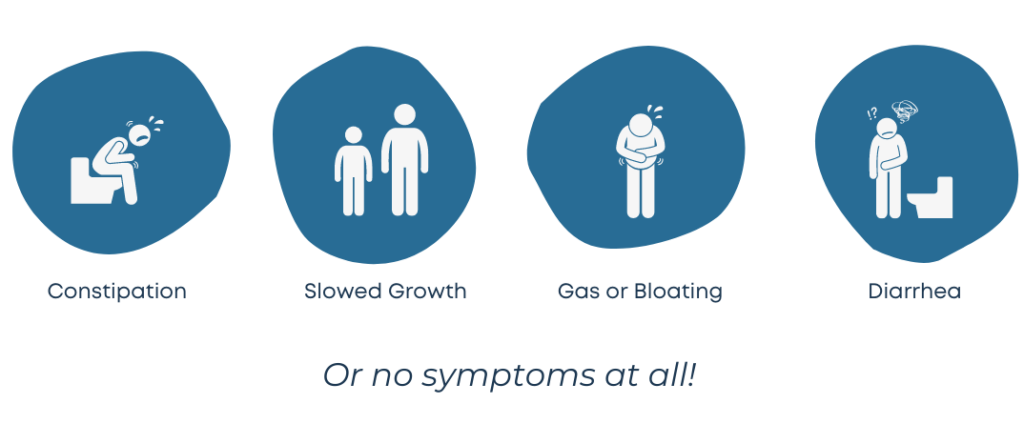About Celiac Disease (continued)
About Celiac Disease
What is Celiac Disease?
Celiac disease is an auto-immune disease triggered by sensitivity to gluten. In someone with celiac disease, the body gets confused and attacks the intestinal lining when gluten is present. The intestinal lining becomes worn down. It then cannot properly absorb nutrients. If left untreated, celiac disease can eventually lead to serious complications.
What is Gluten?
Gluten is a sticky protein found in wheat, barley, rye and other grains. It is the protein that makes dough stretchy and helps hold it together. It is found in many of our everyday foods such as breads, pasta, cereal, and even foods you wouldn’t expect.
What is Celiac Disease?
Celiac disease is an auto-immune disease triggered by sensitivity to gluten. In someone with celiac disease, the body gets confused and attacks the intestinal lining when gluten is present. The intestinal lining becomes worn down. It then cannot properly absorb nutrients. If left untreated, celiac disease can eventually lead to serious complications.
What is Gluten?
Gluten is a sticky protein found in wheat, barley, rye and other grains. It is the protein that makes dough stretchy and helps hold it together. It is found in many of our everyday foods such as breads, pasta, cereal, and even foods you wouldn’t expect.
What is Gluten?
Gluten is a sticky protein found in wheat, barley, rye and other grains. It is the protein that makes dough stretchy and helps hold it together. It is found in many of our everyday foods such as breads, pasta, cereal, and even foods you wouldn’t expect.
How and When Does Celiac Disease Develop?
Like other auto-immune diseases, both genetic and environmental factors play a role in celiac disease. Children must have a certain combination of genes, and must be exposed to a diet containing gluten. But we still don’t understand why some people then get celiac disease and others do not.
Celiac disease can develop at any age. Symptoms can be severe, mild and even no symptoms at all. Left untreated, celiac disease can decrease absorption of key nutrients or lead to loss of them by the body. This may lead to long-term problems.
How and When Does Celiac Disease Develop?
Like other auto-immune diseases, both genetic and environmental factors play a role in celiac disease. Children must have a certain combination of genes, and must be exposed to a diet containing gluten. But we still don’t understand why some people then get celiac disease and others do not.
Celiac disease can develop at any age. Symptoms can be severe, mild and even no symptoms at all. Left untreated, celiac disease can decrease absorption of key nutrients or lead to loss of them by the body. This may lead to long-term problems.
How is Celiac Disease Diagnosed and Treated?
The most accurate way to diagnose celiac disease is by doing a biopsy of the intestinal wall. However, simpler tests, like genetic and auto-antibody testing, can help provide useful information to guide next steps. If someone experiences symptoms of celiac disease, or has auto-antibodies, they should discuss with their doctor to decide how to best proceed.
The good news about celiac disease is that the intestine can be healed. This is done by changing to a diet containing little or no gluten. Advice and follow-up with a pediatrician or gastroenterologist is important.
How is Celiac Disease Diagnosed and Treated?
The most accurate way to diagnose celiac disease is by doing a biopsy of the intestinal wall. However, simpler tests, like genetic and auto-antibody testing, can help provide useful information to guide next steps. If someone experiences symptoms of celiac disease, or has auto-antibodies, they should discuss with their doctor to decide how to best proceed.
The good news about celiac disease is that the intestine can be healed. This is done by changing to a diet containing little or no gluten. Advice and follow-up with a pediatrician or gastroenterologist is important.
What are Some Symptoms of Celiac Disease?
People who have celiac disease may show a range of symptoms or none at all! Here are some common symptoms:
What are Some Symptoms of Celiac Disease?
People who have celiac disease may show a range of symptoms or none at all! Here are some common symptoms:

What are Some Symptoms of Celiac Disease?
People who have celiac disease may show a range of symptoms or none at all! Here are some common symptoms:
What are Some Symptoms of Celiac Disease?
People who have celiac disease may show a range of symptoms or none at all! Here are some common symptoms:
